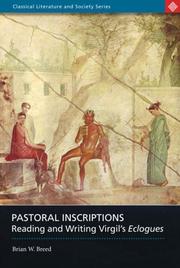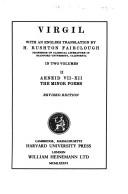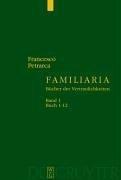| Listing 1 - 10 of 11 | << page >> |
Sort by
|
Book
ISBN: 3111356345 9783111356341 9783111000176 3111000176 Year: 2013 Publisher: Berlin ; Boston : De Gruyter,
Abstract | Keywords | Export | Availability | Bookmark
 Loading...
Loading...Choose an application
- Reference Manager
- EndNote
- RefWorks (Direct export to RefWorks)
Pastoral poetry, Latin. --- Country life --- Latin pastoral poetry --- Latin poetry
Book
ISBN: 1472539664 1472521099 9781472521095 9781472539663 9781472521101 1472521102 9780715636176 0715636170 9780715636176 Year: 2008 Publisher: London Bloomsbury
Abstract | Keywords | Export | Availability | Bookmark
 Loading...
Loading...Choose an application
- Reference Manager
- EndNote
- RefWorks (Direct export to RefWorks)
"Beginning in outer space and ending up among the atoms, "Bucolic Ecology" illustrates how these poems repeatedly turn to the natural world in order to define themselves and their place in the literary tradition. It argues that the 'Eclogues' find there both a sequence of analogies for their own poetic processes and a map upon which can be located other landmarks in Greco-Roman literature. Unlike previous studies of this kind, "Bucolic Ecology" does not attribute to Virgil a predominantly Romantic conception of nature and its relationship to poetry, but by adopting such differing approaches to the physical world as astronomy, geography, topography, landscape and ecology, it offers an account of the Eclogues that emphasises their range and complexity and reaffirms their innovation and audacity. "--Bloomsbury Publishing Beginning in outer space and ending up among the atoms, "Bucolic Ecology" illustrates how these poems repeatedly turn to the natural world in order to define themselves and their place in the literary tradition. It argues that the 'Eclogues' find there both a sequence of analogies for their own poetic processes and a map upon which can be located other landmarks in Greco-Roman literature. Unlike previous studies of this kind, "Bucolic Ecology" does not attribute to Virgil a predominantly Romantic conception of nature and its relationship to poetry, but by adopting such differing approaches to the physical world as astronomy, geography, topography, landscape and ecology, it offers an account of the Eclogues that emphasises their range and complexity and reaffirms their innovation and audacity
Ecology in literature. --- Pastoral poetry, Latin --- History and criticism. --- Virgil. --- Pastoral poetry, Latin. --- Criticism and interpretation. --- Latin pastoral poetry --- Latin poetry

ISBN: 0807861545 9780807861547 0807823473 0807846538 9780807823477 9780807846537 9798890867711 Year: 1997 Publisher: Chapel Hill : The University of North Carolina Press,
Abstract | Keywords | Export | Availability | Bookmark
 Loading...
Loading...Choose an application
- Reference Manager
- EndNote
- RefWorks (Direct export to RefWorks)
Best remembered for his unfinished epic, the Aeneid, the poet Vergil was celebrated in his time both for the perfection of his art and for the centrality of his ideas to Roman culture. The Eclogues, his earliest confirmed work, were composed in part out of political considerations: when the Roman authorities threatened to seize his family's land, Vergil's appeal in the form of Eclogue IX won a stay. Eclogue I appears to be a thank-you for that favor. Barbara Hughes Fowler provides scholars and students with a new American verse translation of Vergil's Eclogu
Book
ISBN: 9789004233089 9004233083 9789004233256 9004233253 1283597160 9786613909619 9781283597166 6613909610 Year: 2012 Volume: 346 Publisher: Leiden ; Boston : Brill,
Abstract | Keywords | Export | Availability | Bookmark
 Loading...
Loading...Choose an application
- Reference Manager
- EndNote
- RefWorks (Direct export to RefWorks)
This study of the Eclogues focuses on Vergil’s exploration of issues relating to the subject of human happiness ( eudaimonia )–ideas that were the subject of robust debate in contemporary philosophical schools, including the community of émigré Epicurean teachers and their Roman pupils located in the vicinity of Naples (“Parthenope”). The latent “interplay of ideas” implicit in the songs of the various poet-herdsmen centers on differing attitudes to acute misfortune and loss, particularly in the spheres of land dispossession and frustrated erotic desire. In the bucolic dystopia that Vergil constructs for his audience, the singers resort to different means of coping with the vagaries of fortune ( tyche ). This relatively neglected ethical dimension of the poems in the Bucolic collection receives a systematic treatment that provides a useful complement to the primarily aesthetic and socio-political approaches that have predominated in previous scholarship. 'This book is insightful and engaging; amatores of Vergil's Eclogues (scholars, students, or enthusiasts) will find the work accessible and profitable.' Kristi Eastin, California State University, Fresno
Virgil. --- Virgil. Bucolica. --- Languages & Literatures --- Greek & Latin Languages & Literatures --- Pastoral poetry, Latin --- History and criticism. --- Virgil. - Bucolica

ISBN: 0715634496 9780715634493 1849668086 184966806X 9781849668088 9781849668064 9781849668071 Year: 2012 Volume: *4 Publisher: London Bristol Classical Press
Abstract | Keywords | Export | Availability | Bookmark
 Loading...
Loading...Choose an application
- Reference Manager
- EndNote
- RefWorks (Direct export to RefWorks)
"Virgil's represent the introduction of a new genre, pastoral, to Latin literature. Generic markers of pastoral in the Eclogues include not only the representation of the singing and speaking of shepherd characters, but also the learned density of the text itself. Here, Brian W. Breed examines the tension between representations of orality in Virgil's pastoral world and the intense textuality of his pastoral poetry. The book argues that separation between speakers and their language in the Eclogues is not merely pastoral preciosity. Rather, it shows how Virgil uses representations of orality as the point of comparison for measuring both the capacity and the limitations of the Eclogues as a written text that will be encountered by reading audiences. The importance of genre is considered both in terms of how pastoral might be defined for the particular literary-historical moment in which Virgil was writing and in light of the subsequent European pastoral tradition."--Bloomsbury Publishing. Virgil's "Eclogues" represent the introduction of a new genre, pastoral, to Latin literature. Generic markers of pastoral in the "Eclogues" include not only the representation of the singing and speaking of shepherd characters, but also the learned density of the text itself. Here, Brian W. Breed examines the tension between representations of orality in Virgil's pastoral world and the intense textuality of his pastoral poetry. The book argues that separation between speakers and their language in the "Eclogues" is not merely pastoral preciosity. Rather, it shows how Virgil uses representations of orality as the point of comparison for measuring both the capacity and the limitations of the "Eclogues" as a written text that will be encountered by reading audiences. The importance of genre is considered both in terms of how pastoral might be defined for the particular literary-historical moment in which Virgil was writing and in light of the subsequent European pastoral tradition
Book
ISSN: 1864399X ISBN: 3110262487 3110196085 1299721680 9783110196085 9783110262483 9783119165952 3119165956 Year: 2013 Volume: 2011 Publisher: Berlin : De Gruyter,
Abstract | Keywords | Export | Availability | Bookmark
 Loading...
Loading...Choose an application
- Reference Manager
- EndNote
- RefWorks (Direct export to RefWorks)
Diese Edition von Vergils früheren Werken stellt eine Fortsetzung der Aeneis-Augabe dar, deren Zielsetzung und Methoden sie teilt. Die Textedition entsteht - auf Grundlage der neuesten Studien zu diesem Thema - aus sorgfältigen Überlegungen zum Stil des Autors heraus. Die handschriftliche Überlieferung und die Testimonia bis zum 9. Jahrhundert wurden eingehend erforscht und die wichtigsten Ergebnisse in einem ausführlichen, aber klaren kritischen Apparat dargestellt, wo der Leser auch die Auslegung der fraglichen Stellen und alle notwendige Angaben zur Literatur finden kann.
Languages & Literatures --- Greek & Latin Languages & Literatures --- Pastoral poetry, Latin. --- Didactic poetry, Latin. --- Country life --- Agriculture --- Latin didactic poetry --- Latin poetry --- Latin pastoral poetry --- Augustan poetry. --- Bucolica. --- Georgica. --- Vergil.

ISBN: 0674990706 0674990714 0434990647 0434990639 9780674990715 9780434990641 Year: 1986 Volume: 64 Publisher: Cambridge (Mass.): Harvard university press,
Abstract | Keywords | Export | Availability | Bookmark
 Loading...
Loading...Choose an application
- Reference Manager
- EndNote
- RefWorks (Direct export to RefWorks)
Agriculture --- -Country life --- -Didactic poetry, Latin --- -Aeneas (Legendary character) --- -Epic poetry, Latin --- -Legends --- -Pastoral poetry, Latin --- -Agriculture --- -871 --- 871 Latijnse literatuur --- Latijnse literatuur --- Rural life --- Manners and customs --- Farming --- Husbandry --- Industrial arts --- Life sciences --- Food supply --- Land use, Rural --- Latin pastoral poetry --- Latin poetry --- Folk tales --- Traditions --- Urban legends --- Folklore --- Latin epic poetry --- Latin didactic poetry --- Poetry --- Translations into English --- Country life --- Didactic poetry, Latin --- Epic poetry, Latin --- Legends --- Pastoral poetry, Latin --- Translations into English. --- Aeneas, --- Virgil --- 871 Latin literature --- Latin literature --- Classical Latin literature --- -Poetry
Book
ISBN: 3110468042 9783110468045 3110473259 3110472694 9783110472691 9783110473254 3110611716 Year: 2016 Publisher: Berlin, [Germany] ; Boston, [Massachusetts] : De Gruyter,
Abstract | Keywords | Export | Availability | Bookmark
 Loading...
Loading...Choose an application
- Reference Manager
- EndNote
- RefWorks (Direct export to RefWorks)
T. Calpurnius Siculus: A Pastoral Poet in Neronian Rome is the first ever detailed examination of the whole of Calpurnius' pastoral corpus in English. It aims to offer an overall picture of Calpurnius’ epigonal and generically transcending poetics and meta-poetics through a thorough comparative analysis of the generic interfaces between the bucolic host genre (as bequeathed to Siculus from Theocritus to Vergil) and various generic modes which operate in Calpurnius’ eclogues, such as epic, panegyric, elegiac, didactic/georgic. The analysis includes themes/motifs, intertexts and allusion, narrative sequences, diction and metre as well as meta-generic/meta-poetic signs, including Calpurnius' redirection and inversion of the Callimachean-neoteric poetological meta-language. The study’s interests also revolve around the ways in which Neronian ideology and imperial politics inform the pastoral narrative and often account for the formalistic change discerned as well as the manner in which Post-Classical diction functions as a targeted, self-conscious linguistic tell-tale of generic evolution. The book is intended for students or scholars working on or interested in Roman pastoral and its generic evolution as well as Neronian Literature.
Latin poetry --- Poésie latine --- Calpurnius Siculus, Titus --- Pastoral poetry, Latin --- History and criticism. --- Calpurnius Siculus, Titus. --- Criticism and interpretation. --- Poésie latine --- Pastoral poetry. --- Theology in literature. --- Bucolic poetry --- Eclogues --- Idyllic poetry --- Rural poetry --- Country life --- Poetry --- Calpurnius Siculus --- Calpurnius Siculus. --- Neronian politics and ideology. --- pastoral poetry.
Book
ISBN: 9783110227062 9783110227079 311022707X 1283165147 9781283165143 3110227061 9786613165145 Year: 2011 Publisher: Berlin ; New York : De Gruyter,
Abstract | Keywords | Export | Availability | Bookmark
 Loading...
Loading...Choose an application
- Reference Manager
- EndNote
- RefWorks (Direct export to RefWorks)
Agonistic or friendly song exchange in idyllic settings forms the very heart of Roman pastoral. It is also a key means of metapoetic stance-taking on the part of the long line of authors who have cultivated this "traditional" genre. The present book examines the motif of song exchange in Roman bucolic poetry under this double aspect: as a central theme with established or constantly forming sub-themes and paraphernalia (thus providing a comprehensive listing, description and analysis of such scenes in the totality of Roman literature), and as the locus where, thanks to its very traditionality, innovative generic tendencies are most easily expressed. Starting from Vergil, and continuing with Calpurnius Siculus, the Einsiedeln Eclogues and Nemesianus, the book focuses on how politics, panegyric, elegy, heroic and didactic poetry function as guest genres within the pastoral host genre, by tracing in detail the evolution of a wide variety of literary, linguistic, stylistic and metrical features.
Pastoral poetry, Latin --- Pastoral poetry, Greek --- History and criticism. --- Virgil. --- History and criticism --- Calpurnius. --- Einsiedeln Eclogues. --- Nemesianus. --- Pastoral. --- Vergil. --- Virgile (0070-0019 av. J.-C.) Bucoliques --- Poésie pastorale latine --- Poésie pastorale grecque --- Histoire et critique --- Poésie pastorale latine --- Poésie pastorale grecque

ISBN: 1281993158 9786611993153 3110201887 3110182394 9783110191592 9783110182392 9783110201888 9781281993151 Year: 2005 Publisher: Berlin : De Gruyter,
Abstract | Keywords | Export | Availability | Bookmark
 Loading...
Loading...Choose an application
- Reference Manager
- EndNote
- RefWorks (Direct export to RefWorks)
In 1350, the Italian humanist and poet Francesco Petrarca decided to form a collection of all his correspondence. The letters deal with multifarious topics, switch between narration and instruction, and the personal and the general, and are addressed to various of his learned friends and contemporaries. They are a treasure trove for the history of ideas. This is the first complete German-language edition of the famous 24 books of the Epistolae familiares ; they have been translated from the Latin by Prof. Berthe Widmer, an acknowledged authority on Petrarch. The translation is accompanied by a
Authors, Italian -- To 1500 -- Correspondence. --- Authors, Latin (Medieval and modern) -- Italy -- Correspondence. --- Pastoral poetry, Latin (Medieval and modern). --- Petrarca, Francesco, 1304-1374 -- Correspondence. --- Romance Literatures --- Italian Literature --- Languages & Literatures --- Authors, Latin (Medieval and modern) --- Authors, Italian --- Petrarca, Francesco, --- Pétrarque --- Petrarch --- Petracco, Francesco --- Petrarca, Francesco (1304-1374) --- Petrarca, Franciscus, --- Petrarch, --- Petrarch, Francesco, --- Petrarcha, Franciscus, --- Petrark, --- Petrarka, Franchesko, --- Peṭrarḳa, Frants'esḳo, --- Pétrarque, --- Петрарка, Франческо, --- פטררקא, פרנצ׳סקו --- Petrarca, Francesco
| Listing 1 - 10 of 11 | << page >> |
Sort by
|

 Search
Search Feedback
Feedback About UniCat
About UniCat  Help
Help News
News